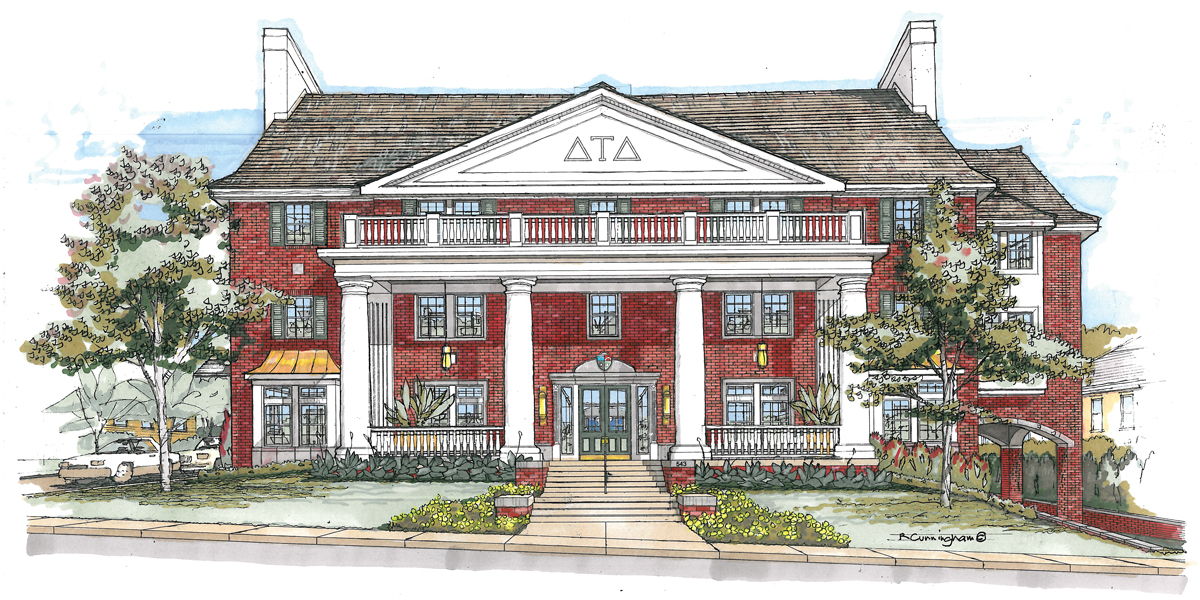Capital Campaigns: What to Consider

It wasn’t too long ago that Greek housing was at least comparable to university and off-campus housing. Enter the student housing boom. Today’s students demand a quality living environment and universities are spending tremendous amounts of money to provide it. That trend isn’t slowing. Gone are the days of the utilitarian, sterile dormitories; instead, colleges are building stylish facilities and providing programming designed to bolster the feeling of a close-knit learning community, to say nothing of private developers.
In order to attract and retain the best and brightest students, many chapters—Delts and our neighbors—are responding by raising substantial funds, oftentimes well in excess of $1 million, for shelter improvement projects. Here’s where they started…
Communicate, Connect, Cultivate
“I never hear from the chapter, except when they need money.” —countless Delt alumni
A survey of more than 67,000 Greek alumni found consistent disappointment with the quality and frequency of communication from their chapters. Also consider that 1.5 million charitable organizations exist in our country now—and they communicate frequently with our alumni. In short, Greeks haven’t done enough to communicate with our alumni and now expectations are being raised by a proliferation of non-profits.
A program that communicates (with), connects (to), and cultivates (within) a chapters alumni base won’t guarantee a gift, but it will better position you to ask for one. Content should be alumni-focused: event invitations and recaps, alumni spotlights and class notes at a minimum. It should also reinforce the chapter as a worthwhile investment, the house corporation as a fiscally responsible steward of funds and the Greek experience and ideals as relevant to the modern student. Finally, utilize a multi-channel communications strategy to deliver your message. Direct mail is still an effective method, but electronic communication and social media can enhance your program.
Develop Your Plan
“Make no little plans. They have no magic to stir men’s blood and probably themselves will not be realized. Make big plans; aim high in hope and work, remembering that a noble, logical diagram once recorded will never die...Think big.” —Daniel Burnham
Donors give to causes that tangibly change an organization or person. Be mindful of this when designing your project. Donors often hesitate to support causes which do not have a reasonable chance for success. A well-conceived plan will instil confidence. If you do not have the experience or time, engage the services of an architect, designer or engineer to prepare conceptual drawings or renderings, as well as a preliminary budget. Firms that specialize in Greek housing understand the challenges that are unique to our shelters.
Develop talking points that answer the following questions: what challenges do we face (you should prioritize and associate a cost with each, if possible), how will our plan address these challenges and what will our organization look like when we accomplish our goals?
Finally, be certain to research and understand other potential sources of funding (loans, lines of credit, rent increase, etc.) and the cash necessary to secure financing and, ultimately, service any debt. Our alumni are sophisticated and will ask tough questions before choosing to support a building project.
Conduct a Pre-Campaign Feasibility Study
“People support a world they help create.” —Dale Carnegie
A feasibility study has two very specific goals: (1) providing decision makers with the information necessary to make good decisions, and (2) identifying alumni who can help make a project successful and getting their input.
The complex and potentially risky decisions your board faces become much clearer when you know:
- What, if any, organizational issues you must address (database inadequacies, chapter concerns, connectivity gaps).
- How your communications program compares to chapters that successfully raise money.
- What kind of message will inspire alumni to give.
- What could be an obstacle.
- Which alumni have the widest and deepest circles of influence.
- Are they willing to help?
- Do they possess the skills and experiences necessary to be a good volunteers?
- What concerns or motivates them?
- A realistic range of fundraising outcomes.
